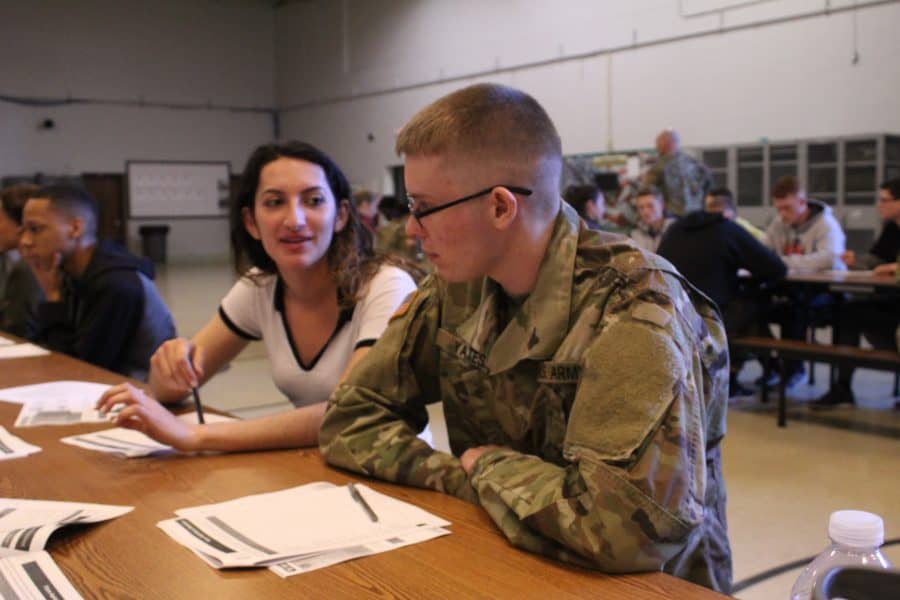David Hose, a former UA student, and Lisa McKinney, an accounting professor at the University, created LIFT four years ago. Though it started as a business school initiative, students from all majors volunteer.
“I have seen individuals gain confidence from this program,” McKinney said. “It makes them feel sure and polished.”
The Culverhouse Learning Initiative and Financial Training program (LIFT) is comprised of 475 students committed to helping the Tuscaloosa, Holt and west Alabama communities. Students teach classes to all groups of people including high school students, veterans, adults, inmates and the elderly. Class topics include iPhone/iPad skills, QuickBooks software, professional development, computer skills, business skills and GED preparation.
Tuscaloosa high schools struggle with large class sizes and few teachers. Through LIFT, college students help shift the ratio from one teacher for every 30 students to one teacher for every five, McKinney said. The high school students are able to get personal help this way, and the learning becomes more engaged.
“I can see individual success,” McKinney said. “I’ve seen the connections between college students and high school students.”
LIFT has about 750 participants throughout the nine-week classes offered. One class is a partnership with Priority Soldier that takes a bus of homeless veterans to the Alabama Workforce Training Center to learn computer and professional skills. McKinney said she expected 30-40 veterans to attend their class.
“Getting computer savvy changes everything,” McKinney said. “This is a completely different world for them.”
Though LIFT operates with a very small budget, McKinney said they plan to start receiving government grants in the future to go along with the donations they already receive.
McKinney said LIFT is entirely student-run, with her as the only faculty member a part of it. Five graduate students run the organization, and they are in charge of making sure classes run smoothly and training the class leaders.
LIFT connected with the Commissioner for the Department of Corrections, Jeff Dunn, last summer. Students teach computer, professional, and money management skills to inmates who are scheduled to be released within the next year. McKinney said some inmates have never even seen a computer, but they want to be successful.
“Inmates are the most affected and the most grateful,” said McKinney, “You see two people of different backgrounds coming together.”
McKinney said it is truly surprising how many people need help.
Sarah Curtin is a graduate student studying accounting, and she is in charge of overseeing QuickBooks and computer literacy courses. Curtin has been a part of LIFT for three years.
“I’ve had the privilege of seeing it grow,” Curtin said.
Curtin said many students start volunteering for LIFT because it is a requirement for honors accounting. Instead of taking quizzes, students volunteer. Curtin said though many get started that way, many stay after meeting their class requirement.
“You get to help someone else as you learn,” Curtin said. “Seeing the light go off makes it so worth it.”
Curtin recalls one participant who was having a hard time finding a job. After about halfway through the course, the participant got a bookkeeping job at DCH.
Being able to follow up with their students can be difficult, Curtin said, because many participants only take one class and don’t have a computer at home.
Curtin said students should get involved because it not only helps others but can help them as well. Curtin got an internship with Ernst and Young in Atlanta, and she credits her experience with LIFT as a major part of getting that internship.
Another student who got their start in LIFT through honors accounting is Jamie Young, a senior majoring in marketing.
“I loved it, and I kept coming back,” said Young.
Young teaches a professional development class, and her students are usually those reentering the workforce ages 30-55. Young said it’s an educational experience for all.
“There’s conversation between students and the community, and they have more to teach me than I them,” Young said.
Young remembers a single mother who was working three jobs to send her children to college. Young said they spoke about her kids and how the family used to live up north.
“She taught her kids to read so they could thrive, but she still didn’t know how to use a computer”, said Young, “It was very inspirational.”
Young said students should get involved because it provides them with a different perspective. Many students are from out of state, so LIFT shows them what life is actually like in this state, Young said.
“We complain about going to class when some people are unemployed or haven’t even gotten over an addiction,” Young said.
McKinney said she believes in the empathy of the students of this generation, and there are still volunteering spaces to fill for this semester.
“This generation is so giving,” McKinney said. “Students have never disappointed me.”









